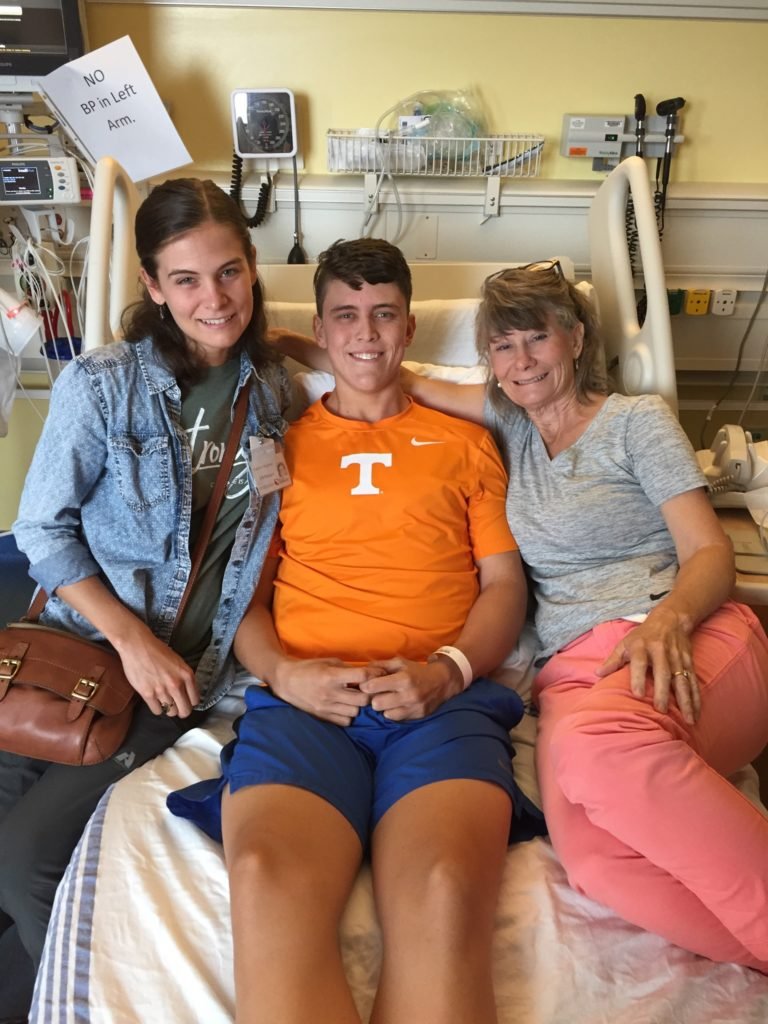It's Not About the Cards You Are Dealt; It's About How You Play Your Hand
Written by Jacob Ragland, liver transplant recipient and college student at the University of Tennessee. Edited by CC Cunningham, CKF Program Manager.
At my high school, every senior is required to recite a personal talk in front of the entire student body and staff. This task was in the back of my mind going into my senior year—I kept a folder of notes and ideas on topics that would really capture the attention of my fellow classmates. It seemed almost obligatory to write about my chronic liver disease—I was diagnosed with biliary atresia at birth. Biliary atresia is a rare liver disease where bile gets trapped inside the liver and causes severe scarring of the liver cells. Ultimately, the liver fails and the only cure is a liver transplant. I had a few other ideas for my talk and ended up writing two essays: one on living with biliary atresia and the idea of an impending liver transplant and the other on the dying art of mastered trade skills. My teacher took an immediate liking to the former and she was not wrong in that it certainly carried a powerful message. In the end, however, I chose the second essay. I couldn’t bring myself to talk about my liver disease because my liver disease has never defined me. I would be giving it too much credit by dramatizing it in front of my school. Few people even knew this fact about me—not because the topic was taboo for me, but because it’s not who I am.
I was lucky that my disease didn’t affect me much throughout my childhood. Aside from the annual checkups to the pediatric gastroenterologists (GIs) in Cincinnati and being unable to play football or other aggressive contact sports, I had no reason to let it keep me from leading the same life as my friends. I know that living to 21 years old with biliary atresia pre-transplant is a miracle in itself and I never went a day without being thankful for the life I had. I always believe that part of my longevity of health was simply believing that I was completely normal and never giving myself any excuses. As soon as I began pursuing my degree in engineering, I began a series of stints in the hospital due to remitting cholangitis, a recurring infection in my bile duct system. Each episode was worse than the last and the impending transplant became much more tangible. I adopted a motto of sorts as my chronic disease became more and more relevant: “God deals us one hand of cards in life, but only you can decide how to play them. Never fold. There are so many ways to play even the worst hands you may be dealt.”
With this motto in mind, every time I was released from the hospital, I would jump right back into running and working out as I always have. It would take months to even be close to where I was before, but I didn’t work out for anyone else besides myself. If I could only run nine-minute miles, then that’s my best. I’ll run faster or longer next time. This trend continued: not letting a disease define me. I never once believed that I could have a better life than I already had.
Life works out in funny ways. On July 25th of last year, I skipped a day of my summer engineering internship to make up a final exam that I had missed due to my last bout of cholangitis. On that one morning, 45 minutes before the test, my dad called me and told me to pack a bag. They had found a liver for me—a donor match. I was home at the time and, before my dad hung up, he reminded me, “Good luck telling Mom!” That would definitely be the challenge of the day, but I knew I had to tell her right then. I walked upstairs and gave her a big bear hug as she was washing her face over the sink. I casually stated, “Dad called. He said he just heard from the hospital. We got an offer.”
My sister had just returned to Little Rock, AR to get ready for her second year of medical school but, after hearing the news, she turned right around and drove back to Cincinnati that day. I received my transplant on my sister’s 23rd birthday, so her birthday is now my “rebirth-day.” At the time, I sarcastically apologized for ruining her birthday, but she reminded me that she couldn’t have asked for a better gift in her life.

Before my transplant, I always wondered what my emotional state would be on the day I received the long-awaited phone call. I wasn’t scared at all when the day did finally come, but what did keep me up was thinking about my donor and their family—this person who had passed away, but made the ultimate decision to pass their life on. My relationship with my donor is something that I may never fully comprehend; however, not a day goes by where I am not eternally grateful. For reference, the first words I spoke under labored breath on the night after surgery was, “I am so thankful.”

To my own surprise, the month-long experience I had in Cincinnati after my transplant was the happiest, most magical time of my life. I can only say that because of the amazing people in my life. With all of my family around me and good friends dropping by to visit throughout my hospital stay, it honestly seemed more like a vacation. My transplant was the event that brought everyone together!
I can’t say that everything was flawless. Transplants rarely go without some unexpected hiccups. I acquired kidney injuries that carried over months after surgery and I received both kidney and liver biopsies after possible acute rejection. I’ve always found life easier to live when I have goals in mind. This is part of the reason why my transplant was so simple: my only goal was to recover and get better. The doctors do their part, I do my part by sticking to healthy habits, and my family and friends all support these efforts. Even through all of the sickness, hiccups, and mental challenges, I’m confident that I have done all that I can do to lead the best life possible. I played my cards to the best of my ability.

